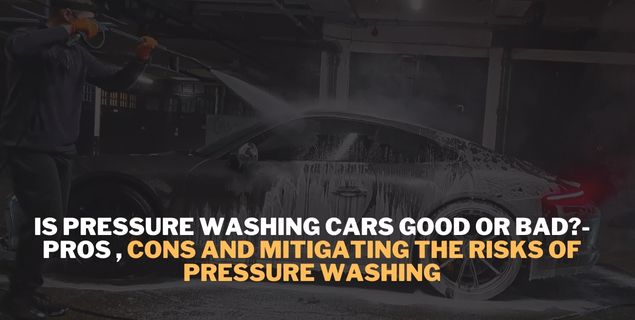Pressure washing has become a popular method for cleaning various surfaces, and cars are no exception. While it can be an effective way to remove dirt and grime, there are both advantages and disadvantages to pressure washing cars. In this article, we will explore the pros and cons of this cleaning method, helping you make an informed decision about whether pressure washing is good or bad for your vehicle.
Pros and Cons Pressure Washing Cars
Pros of Pressure Washing Cars:
- Efficiency and Time-Saving: One of the most significant advantages of pressure washing cars is its efficiency. The high-pressure water jets can swiftly remove dirt, mud, and debris, drastically reducing the time and effort required for cleaning. This is particularly beneficial for individuals with busy schedules who seek a rapid yet effective solution to keep their vehicles in pristine condition.
- Tough Stain Removal: Pressure washing excels at tackling stubborn stains that may resist traditional cleaning methods. Whether it’s bird droppings, road tar, or accumulated grime, the force of the water jets can effectively eliminate these challenging contaminants, restoring the vehicle’s surface to a clean and polished state.
- Versatility: Pressure washers are equipped with adjustable nozzles, providing users with the flexibility to customize the water pressure according to the specific cleaning task. This versatility allows for efficient cleaning of different parts of the car, from the robust exterior surfaces to more delicate areas.
- Water Conservation: In an era where environmental sustainability is paramount, pressure washing offers a notable advantage by using less water compared to traditional washing methods. The high-pressure jets ensure thorough cleaning with minimal water usage, contributing to water conservation efforts.
- Accessibility: Pressure washers are widely available for purchase or rental, making this cleaning method accessible to a broad range of car owners. With various models and sizes to choose from, individuals can find a pressure washer that suits their needs and budget.
Cons of Pressure Washing Cars:
- Paint Damage:Perhaps the most significant concern associated with pressure washing is the potential damage to the car’s paint. The high-pressure water jets can chip, peel, or scratch the paint, leading to an uneven and unsightly appearance. This risk is particularly heightened when using pressure washers with excessive pressure or incorrect techniques.
- Risk of Denting and Scratching: Incorrect use of pressure washers, especially when the nozzle is too close to the vehicle’s surface or the pressure is too high, can increase the risk of dents and scratches. This compromises the structural integrity and overall aesthetic appeal of the vehicle.
- Water Intrusion: The forceful nature of pressure washing may lead to water intrusion into sensitive areas of the car, such as door and window seals. This poses a risk of water damage inside the vehicle, affecting electronics, upholstery, and other components.
- Trim and Decal Damage: Pressure washing can strip away decals, stickers, and trim, particularly if they are not securely attached. This not only affects the vehicle’s aesthetics but also necessitates additional time and resources for restoration.
- Cost of Equipment: Investing in a high-quality pressure washer can be a significant upfront cost. Additionally, improper use may lead to repair or replacement expenses, adding to the overall investment associated with pressure washing.
- Environmental Impact: Despite the water conservation benefits, pressure washing can have environmental consequences. Runoff water from the cleaning process may contain detergents, chemicals, and contaminants, contributing to pollution if not properly managed.
- Safety Concerns: The high-pressure nature of pressure washers poses safety risks, including the potential for injury to the user or bystanders. Protective gear, including eye protection, is essential to minimize these risks.
- Surface Sensitivity: Not all vehicle surfaces are created equal, and pressure washing may not be suitable for certain materials. Delicate surfaces, such as convertible tops or intricate detailing, can be damaged by the force of high-pressure water.
Mitigating the Risks of Pressure Washing
- Proper Equipment Selection: Choosing the right pressure washer for your car is crucial. Opt for a model with adjustable pressure settings and nozzle options, allowing you to customize the cleaning process based on the specific requirements of your vehicle.
- Appropriate Pressure Levels: Adhering to recommended pressure levels is vital to prevent paint damage and other potential issues. Many pressure washers come with user manuals that provide guidance on suitable pressure settings for different cleaning tasks.
- Maintain a Safe Distance: Maintaining an appropriate distance between the pressure washer nozzle and the car’s surface is essential. Being too close can increase the risk of paint damage and water intrusion, while maintaining a safe distance ensures effective cleaning without causing harm.
- Use of Detergents: Incorporating car-friendly detergents into the pressure washing process can enhance cleaning effectiveness while minimizing the need for excessive pressure. Choose detergents specifically designed for use with pressure washers and automobiles.
- Protective Measures: To mitigate safety concerns, users should wear appropriate protective gear, including eye protection and, if necessary, waterproof clothing. Additionally, bystanders should be kept at a safe distance during the cleaning process.
- Regular Maintenance: Regular maintenance of both the pressure washer and the vehicle is crucial. Ensuring that the equipment is in good working condition and free from defects reduces the risk of unexpected issues during the cleaning process.
- Professional Assistance:If unsure or inexperienced, seeking professional car washing services may be a prudent choice. Professional detailers have the expertise to assess the needs of your vehicle and employ the appropriate cleaning methods without causing damage.
Conclusion:
Pressure washing cars is a powerful and time-efficient method for maintaining the cleanliness of your vehicle. However, like any tool, it requires a nuanced and careful approach to prevent potential damage. By understanding the advantages and disadvantages, adhering to best practices, and taking appropriate precautions, car owners can harness the benefits of pressure washing while preserving the integrity of their vehicles.
In the ever-evolving landscape of automotive care, pressure washing stands as a valuable option for those seeking efficiency and effectiveness. Balancing the convenience of this method with a commitment to preserving the longevity and appearance of your vehicle ensures a harmonious relationship between the power of pressure washing and the delicacy required for automotive care.
As technology advances and best practices evolve, pressure washing is likely to remain a prominent choice for car enthusiasts and casual owners alike, provided it is wielded with knowledge, caution, and a deep appreciation for the intricate balance between cleaning and preservation.

